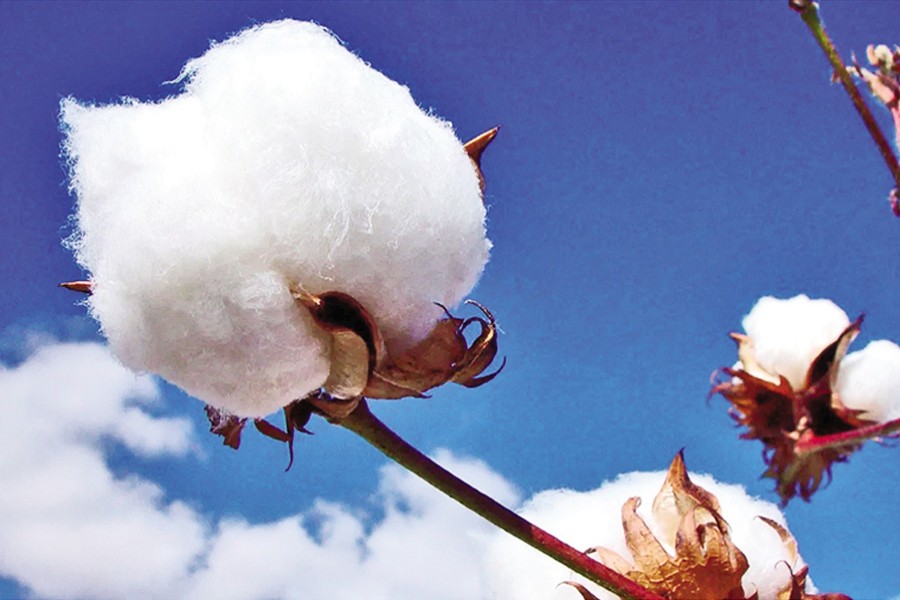Textile millers delay release of imported cotton over 2pc AIT
Port congestion looms

Published :
Updated :

Textile mill owners show reluctance to release their imported cotton from ports, raising concerns about potential container congestion, which could further disrupt operations at major ports, including Chattogram and Beanpole, according to industry insiders.
They also said the government has imposed a 2.0 per cent advance income tax (AIT) on the import of raw cotton, which would significantly impact their capital.
In light of this, none of the large mill owners is interested in releasing their basic raw materials.
To discuss the impacts of the newly-imposed AIT, Finance Adviser Dr Salehuddin Ahmed held a meeting with textile millers and apparel sector leaders at his office on Monday afternoon.
National Board of Revenue (NBR) Chairman Md Abdur Rahman Khan was present there along with Income Tax Policy Member AKM Badiul Alam.
During the meeting, the finance adviser asked the NBR chairman to find a solution considering the AIT's impact on the industry as the government aims to make an announcement as soon as possible, according to sources.
Md Nurul Islam, founder of Bangladesh's largest textile mill under Noman Group, told The Financial Express they are not releasing any cotton from the port.
He said they import huge quantities of cotton every month.
Noman Group's annual export amounts to over $1.0 billion.
Envoy Textiles Founder Chairman Kutubuddin Ahmed told The Financial Express he is worried about the new AIT.
He said he is unable to release his cotton shipments because of the AIT. He also said he is waiting for a move from the government in this regard that will bring relief.
Moreover, he said his business costs would shoot up if the AIT stays.
Md Badsha Mia, managing director of Badsha Textiles, told The Financial Express, "We have no scope to release cotton from the port by paying such high taxes, which will not be adjusted with the income tax at the end of the year." Echoing similar concerns, Saleudh Zaman Khan (Jitu), managing director of NZ Tex Group, said cotton imported by him is also stockpiled at the Chattogram port, but he is unable to release it.
"If the government allows us to release the raw materials under an undertaking, it will be a big relief for the industry. Otherwise, most of us will have to pay port demurrage charges after the expiration of the seven-day free facility."
Engineer Razeeb Haider, director of the Bangladesh Textile Mills Association (BTMA), warned that if the government delays making a decision, it could lead to potential container congestion, which might further disrupt port operations after a three-day backlog caused by the recent "complete shutdown" programme observed by NBR officials countrywide.
A top official of Square Denims said their commercial team is facing challenges in releasing cotton shipments as they encountered a 2 per cent AIT and a 1 per cent customs duty (CD) during the bill of entry submission. As a result, they are moving slowly with the release.
At the meeting, Saleudh said, "We have to pay the advance tax with loans. If the government does not remove the tax, none of us will be able to do business."
Showkat Aziz Russell, president of the BTMA, claimed Indian spinners are trying to dump their yarn in the Bangladeshi market by taking advantage of various incentives provided by their government to enhance competitiveness.
On the other hand, local spinners are under increasing pressure due to rising gas and electricity prices, higher interest rates, and the government's recent decision to raise the corporate tax from 15 per cent to 27.5 per cent, he explained.
Additionally, the newly-imposed 2 per cent AIT on cotton imports is further burdening the sector, said Russell.
He noted that while the government has provided an option to adjust the AIT, it involves a complicated bureaucratic process.
Despite this, the sector faces a combined tax burden of around 67 per cent due to source tax deductions - something it has no capacity to absorb, said the BTMA president.
"Considering the situation, we have observed that recent policy changes seem to favour Indian millers over local producers," he said.
"We have our own spinning and denim mills. Yet, our textile unit's general manager is unwilling to procure yarn from our own spinning mill because it would increase the total production cost," he added.
Russell urged the finance adviser to intervene by removing the AIT and reducing the corporate tax rate to 12 per cent - the same as the readymade garment sector, which is set to enjoy this rate until 2028.
Square Textiles Managing Director Tapan Chowdhury told the meeting India has highly incentivised its domestic backward linkage industry and this could be a threat to Bangladesh's readymade garment (RMG) industry.
"Apparel is a labour-intensive industry. As India has huge amounts of land, it can easily establish factories, create jobs, and take over Bangladesh's dominant position in the RMG sector," he said.
However, he is not as much worried about the pharmaceutical industry because it is technical.
The NBR chairman told the meeting the tax structure was based on a misunderstanding.
"We thought traders were importing cotton and selling it to millers for profits," he said.
"Our assumption was that if someone imports cotton and makes a profit, he should be able to pay taxes. Based on that, we estimated that Tk 8,900 million would be collected from this item," he added.
newsmanjasi@gmail.com


 For all latest news, follow The Financial Express Google News channel.
For all latest news, follow The Financial Express Google News channel.